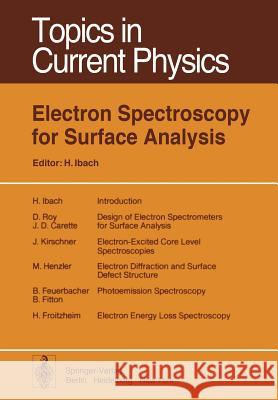Electron Spectroscopy for Surface Analysis » książka
Electron Spectroscopy for Surface Analysis
ISBN-13: 9783642811012 / Angielski / Miękka / 2012 / 258 str.
The development of surface physics and surface chemistry as a science is closely related to the technical development of a number of methods involving electrons either as an excitation source or as an emitted particle carrying characteristic information. Many of these various kinds of electron spectroscopies have become commercially available and have made their way into industrial laboratories. Others are still in an early stage, but may become of increasing importance in the future. In this book an assessment of the various merits and possible drawbacks of the most frequently used electron spectroscopies is attempted. Emphasis is put on prac tical examples and experimental design rather than on theoretical considerations. The book addresses itself to the reader who wishes to know which electron spectroscopy or which combination of different electron spectroscopies he may choose for the particular problems under investigation. After a brief introduction the practical design of electron spectrometers and their figures of merit important for the different applications are discussed in Chapter 2. Chapter 3 deals with electron excited electron spectroscopies which are used for the elemental analysis of surfaces. Structure analysis by electron diffrac tion is described in Chapter 4 with special emphasis on the use of electron diffrac tion for the investigation of surface imperfections. For the application of electron diffraction to surface crystallography in general, the reader is referred to Volume 4 of "Topics in Applied Physics.""











